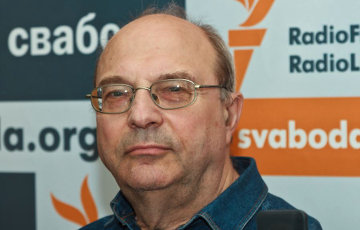Aliaksandr Alesin: Lukashenka Fears “Colour Revolutions” Most Of All
- 25.01.2016, 18:24
- 3,049

Photo: Radio Svaboda
Fear of popular unrest or riots, similar to the Revolution of Dignity in Ukraine, has been reflected in the new military doctrine in Belarus.
Radio Svaboda has been told about that by an independent military expert Aliaksandr Alesin, who commented on the statement of Aliaksandr Lukashenka at the session of the Security Council on January 22, which concerned the new “military doctrine.”
– One should not expect much from such documents, are important here, what is emphasized is important here, and some of the emphases have really been made in a new way. The situation around our country has changed really. On the one hand, Russia has aggravated this situation when it responded to the turnaround by Ukraine, its reorienting to the union with NATO, and on the other hand, NATO has intensified its activities in our region. Russia responded to that by more strained relations with Poland, with the Baltic States, and as a result, the leadership of Poland calls upon build-up of the NATO forces on the territory of the country, and reinforcement of its own armed forces. That is, escalation of the military and political tensions is obvious. The highest officials from NATO and Russia have not called that a new cold war yet, but to my mind, it is going on already. Belarus should respond to that, and that’s the reason for emerging of the new military doctrine.
– Is war more probable under this doctrine?
– Lukashenka is saying say unequivocally, that Belarus would have to call in the military under certain circumstances. But is it really something new? I do not see significant changes except a more resolute tone. Similarly, according to the old doctrine, under the agreements with Russia and in the framework of the CSTO, in the case of a conflict of Russia with the West, we were to take sides with Russia, and notably, there is no difference, who would start the conflict first – and it remains the same now. But as far as the “national security threat” nuances are meant, these changes are visible. Lukashenka certainly sees the main threat to the sovereignty in the “externally provoked colour revolutions,” it is a sore subject for him. But the threat of a hybrid war, like the war which has swept over a part of Ukraine, is articulated more clearly. It is obvious that the situation in Ukraine is not ranked the last in Lukashenka’s head. He is also concerned by people in our country who had received military skills during the recent events in Ukraine, and notably without making a distinction between their ideology colourings.
– In case of a global conflict of Russia with the West, Belarus is to take the side of Russia, you believe. Is there an opportunity for Belarus to avoid that?
– Undoubtedly, it would be Russia’s choice predominantly, but today’s Belarus cannot put anything up against that. A great pressure is already being put on it for trying to maintain relations with the West. Look, as soon as Belarus normalizes these relations a little, a propagandist wave already emerges in Russia, according to which Belarus is a “Trojan horse”, and it would be the same with Belarus as with Ukraine allegedly, and it would run away to the West. There are enough such forced in Russia, and pressure could be put through them not only on Lukashenka’s authorities, but on the minds of common people. On the other hand, with Belarus’ turn to the West, Russia’s western border really becomes exposed. Historically, Russia is a big country, but its heart is just a few hundred kilometres east of Europe, so it would do anything not to bare this flak in its western part. The events in Ukraine, what happened after the Maidan, are a response to Ukraine’s shift to the friendship with NATO, away from the union with Russia. When in Belarus a force would emerge, which would re-orientate it to Europe, Russia is to counteract that in every possible way, too. People should bear that in mind here.
– The new military doctrine pays more attention to the military-industrial complex. Will the situation reach the point of militarization of economy, to the situation when most people start to work “for defence industry,” and we would assemble tanks instead of tractors, like in the former Soviet Union?
– I think that such fears are unwarranted. To my mind, the state would be able to activate military and industrial development only thanks to assistance to private enterprises in this sphere, the ones which already exist and are working. I mean, to help such enterprises as Teatraerd, Minotor-service or others, there are enough of them, despite the domination of state manufacturers, to work more efficiently. I am referring to legal assistance, such measures in defence of their interests in the international arms markets. But as fat as militarization of the state sector of the economy is meant, there are many limitations for Belarus in that: pensioners should be supported, as well as the social sector (to support police), security services, the army. This weight is heavy, so it is simply impossible to afford high expenses for militarization of the economy.









